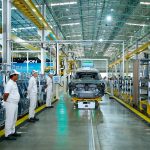Noel Celis/Getty Images
- On Monday, trading of Evergrande was halted on the Hong Kong stock exchange.
- The move came after Evergrande missed a key bond interest payment last week.
- See more stories on Insider’s business page.
Trading in shares of debt-laden China Evergrande was suspended on Monday after it missed a key bond interest payment last week, its second offshore debt obligation in a week, with market watchers jittery as the group’s troubles unravel.
Shares of its unit Evergrande Property Services Group were also suspended, according to the Hong Kong stock exchange, however, China Evergrande New Energy Vehicle Group Ltd. is still trading, according to Bloomberg.
According to The Age, the last shares were traded around 11.45 a.m. The most recent trading price was $HK2.95, down from a high of $HK17.26 in January.
Shares in Evergrande have plunged 80% so far this year, while its property services unit has dropped 43% as the group scrambles to raise funds to pay its many lenders and suppliers.
According to Bloomberg, the move comes as a dollar note issued by Jumbo Fortune Enterprises worth $260 million matures. The note reached maturity on Sunday, Oct. 3, which means Evergrande effectively must pay it on Monday.
Because the note has no grace period, non-payment of the note would constitute a default, Bloomberg reported.
Hong Kong’s markets appear to be reacting negatively to the news. As of 9:48 a.m. on Monday morning, the Hong Kong exchange was down around 2% overall.
With liabilities equal to 2% of China’s GDP, Evergrande has sparked concerns its woes could spread through the financial system and reverberate around the world, though worries have eased somewhat after the central bank vowed to protect homebuyers’ interests.
The trading pause comes after Hong Kong’s finance chief told The South China Morning Post that the country’s exposure to Evergrande was “minimal.”
Financial Secretary Paul Chan Mo-po told the outlet: “We have taken stock of the banking sector’s exposure to Evergrande, which is only 0.05% of [combined] assets. It is very minimal and won’t cause us any systemic risks.”
This is a developing story.
Powered by WPeMatico






